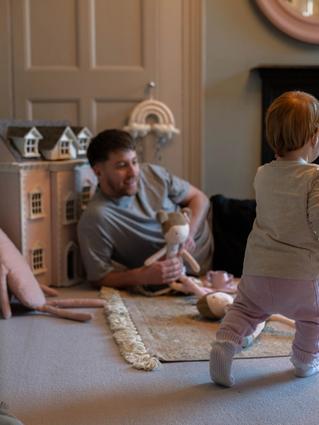
- Home
- Tools And Resources
- Baby Development Calendar
- 13 - Month - Old | Walking, Socialising & Routines
13 months old
2 min
Toddlers of this age…
- Can often stand unaided and take a few steps
- Have good manual dexterity
- Seem to be tempted most by ‘forbidden’ things!
Your toddler
- Once little ones start to walk, they can get around much more quickly, so it pays to be careful!
- A walking toddler may also be a climbing toddler, so be wary of leaving your child alone.
- Can your little one say any words yet? It's a good idea to record them – you'll both have a good laugh over it someday!
Encouraging adventure
Once babies learn to walk, the world opens up to them, and being able to explore is essential for their physical development and confidence. Is there a ‘soft play’ group near you where little ones can climb and bounce safely? Or a playground with baby swings? These activities will give you a chance to meet up with other mums and dads, too.
Learning to socialise with other children is important for toddlers. Some will already have this opportunity if they attend a nursery or go to a childminder. But babies who are at home with mum or dad (or their grandparents) need to mix with other children, too.
Of course, at this age, “mixing” can often lead to a few tears and tussles! For example, it’s normal for children this age not to understand why they can't grab a toy from someone else. If this happens, it's best to just return the toy to its owner and calmly tell your toddler that they shouldn’t take other people's toys – then distract, distract, distract.
Spending time with your toddler
Life can feel even busier now that your little one is on the move! Finding ways to simplify the daily routine can help you make the most of those shared moments – whether that’s playing together, reading a favourite story, or heading out for a walk. Quick and convenient meal options can come in handy, especially on those days when there's not much time to cook.
Bedtime routines and bottles
Many toddlers still enjoy a bedtime bottle at this age, but it’s a good idea to start introducing a beaker instead – it’s a healthier choice for growing teeth. If your toddler tends to get hungry before bed, offering a gentle, filling drink can be a comforting part of their evening routine. You know your child best – a consistent, calm bedtime can help everyone wind down after a busy day.
More vaccinations
You and your toddler are getting to be old hands at this by now! (Luckily, though, you'll both get a break after this lot – no more jabs until age 3!)
This time, your little one will get protection against measles, mumps and rubella, plus the third dose against pneumococcal infection. Find out more with the NHS vaccination planner.
Looking after yourself
If your toddler is still waking in the night (many do at this age), you may find yourself suffering from sleep deprivation. Take a nap when you can, and if it all gets a bit much, try asking a friend or relative if they can look after the baby while you have a rest.
